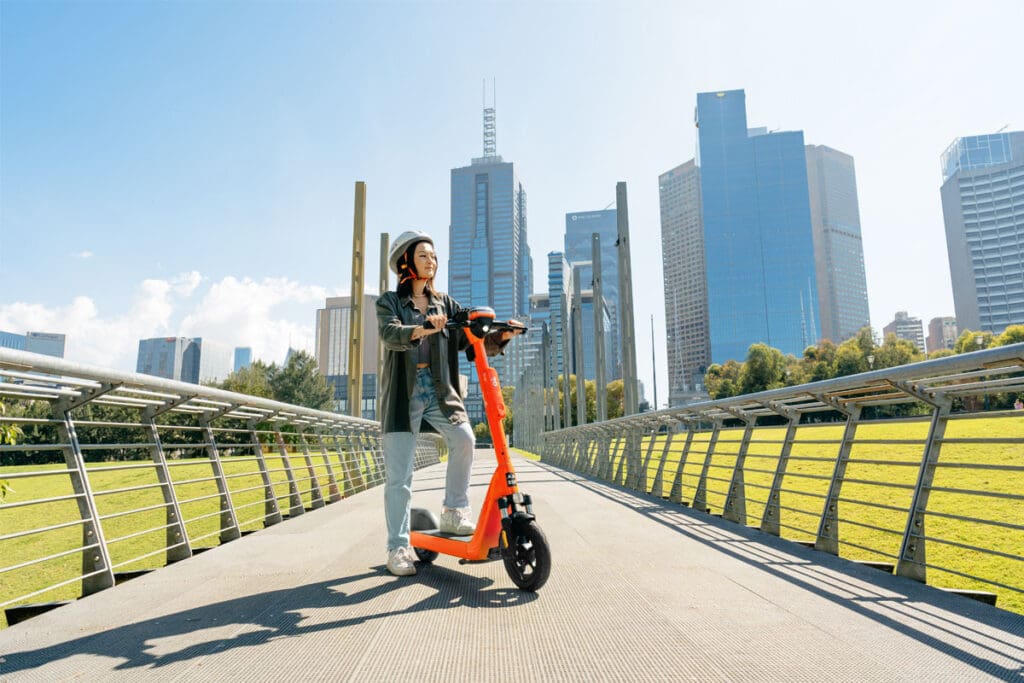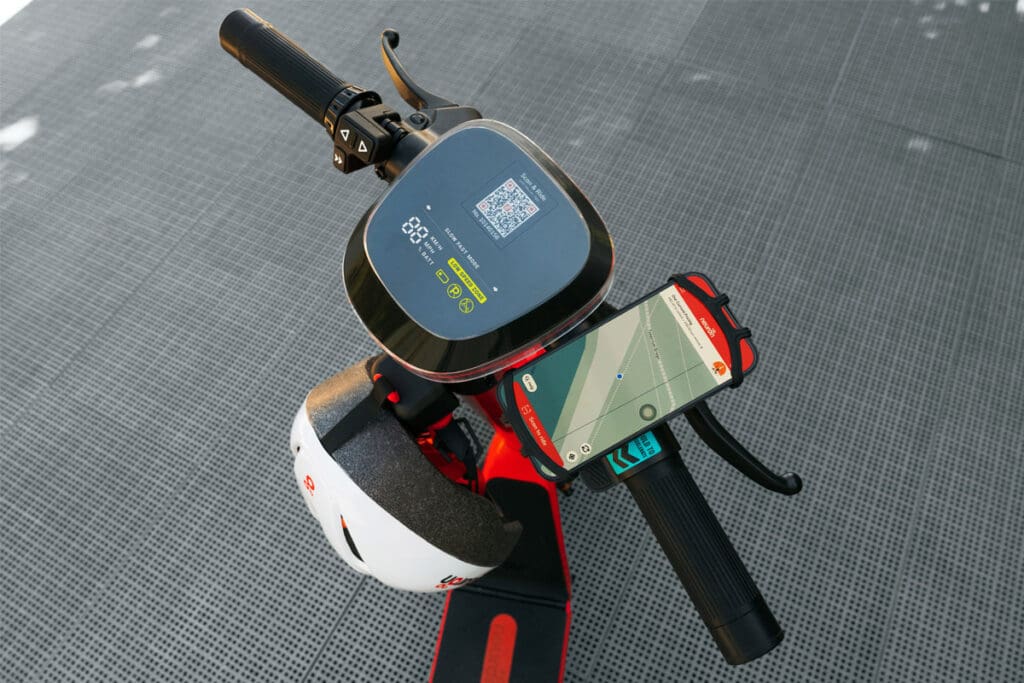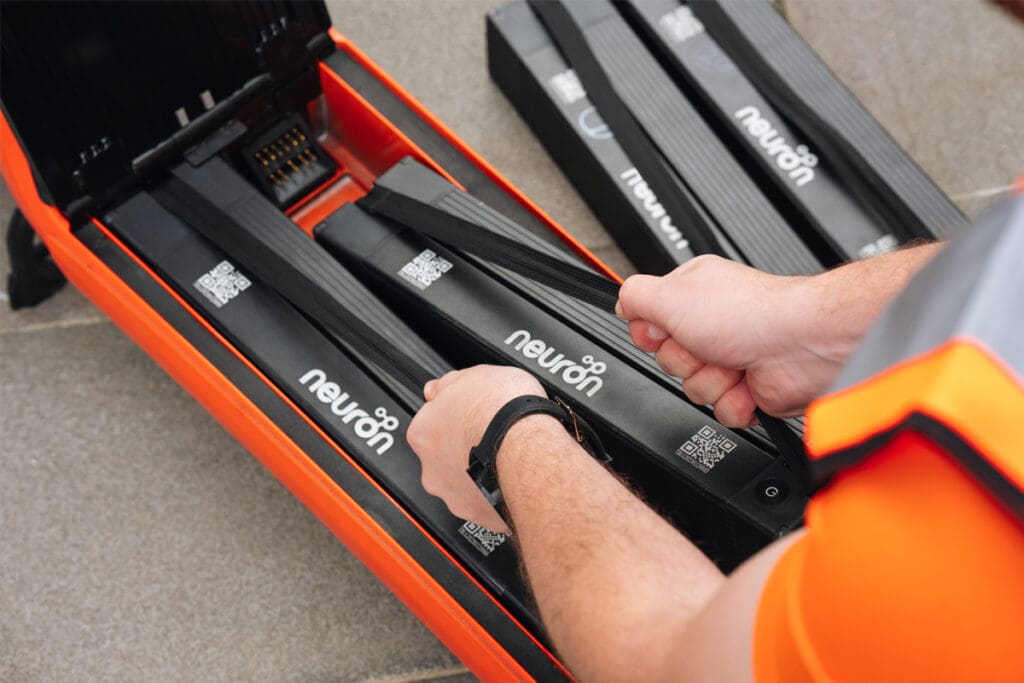Neuron Unveils New Scooter as Melbourne Named World’s Biggest Market

Melbourne, Victoria
Neuron Mobility this week unveiled its latest shared e-scooter, the N4, launching 1,000 of the new model in Melbourne.
The Singapore-based company, which designed the N4 entirely inhouse, claims it is “the most rider-focused, sustainable and toughest e-scooter ever built”.
The N4, launched on Tuesday, has an upgraded 300-watt, 48-volt, electric motor which delivers 39 Nm of torque and, according to Neuron, has been precisely tuned to deliver a more linear acceleration profile.
“The N4 has received upgraded front suspension combined with pneumatic tyres to significantly reduce road vibration and enhance comfort and traction.”
“It allows the e-scooter to reach its top speed faster in a smoother, more predictable manner, giving the rider added confidence,” Neuron says in a statement.
“It has been engineered to deliver best-in-class hill climbing performance, dynamically delivering power exactly when it is needed. The N4 can comfortably climb a 17-degree incline carrying a rider of 90kg.
“Neuron’s engineers have set up the vehicle to deliver unparalleled comfort, stability and manoeuvrability even at low speeds.”
The N4 has received upgraded front suspension combined with pneumatic tyres to significantly reduce road vibration and enhance comfort and traction.
Neuron’s statement says the N4 has a swept handlebar set at a higher level than most e-scooters to improve ergonomics and overall riding experience.
“There is an all-new LED dashboard, powerful headlight, indicators, phone holder and a sturdy double kickstand which can operate on a range of gradients and surfaces,” it says.
Features carried over from the N3 include Neuron’s world-first app-controlled Helmet Lock, which integrates a helmet to the e-scooter, and a ‘talking e-scooter’ voice guidance.
According to Neuron, the N4 has been designed to be more durable and economical to operate to improve unit economics.
“The deck and frame of the e-scooter is made from a single die-cast piece of aluminium, which increases the N4’s robustness. The e-scooter has undergone rigorous crash and stress testing both in the lab and in real-world conditions in a range of climates to improve overall e-scooter integrity and component reliability,” Neuron says.
“It will achieve a five-year or 10,000km life cycle, with significantly longer intervals between required workshop visits than Neuron’s previous generation e-scooters.”
“The N4 introduces a new sequential, dual-battery system which can be deployed with one or two batteries, depending on the demand in the city or to manage peak periods.”
The N4 is fitted with rubber bumper strips along each side of the deck to protect the body of the e-scooter from the daily wear and tear typically faced by rental e-scooters.
“The bumpers improve overall durability and significantly reduce cosmetic damage which is both unappealing to riders and also expensive for operators to rectify,” the company added.
All wires and cables are enclosed within the e-scooter and Neuron has added a transparent polycarbonate cover to protect the dashboard from damage and vandalism.
In another industry first, the frame and body of the N4 is constructed using certified 80% recycled aluminium, significantly reducing the manufacturing footprint of the vehicle.
In addition, the N4 introduces a new sequential, dual-battery system which can be deployed with one or two batteries, depending on the demand in the city or to manage peak periods.
“As well as extending the range of the e-scooter, having two batteries reduces charging time by around 50%, compared to using a single battery of the same combined capacity, which significantly boosts operational efficiency,” Neuron says.
The dual system builds upon Neuron’s release of the world’s first battery swappable rental e-scooter in 2018.

Melbourne Confirmed as World’s Top Scooter Market
Neuron said Melbourne is the company’s most popular e-scooter program worldwide. Residents and tourists have taken more than two million trips and travelled over four million kilometres since Neuron launched in the city in February 2022.
The release of the N4 e-scooter on Melbourne streets follows the Victorian State Government’s extension of the city’s e-scooter program for another six months.
Neuron said the 1,000 N4s rolled out in Melbourne this week are replacing N3 units already on the street, so the total number of Neuron e-scooters in the city will remain the same.
Neuron’s Head of Australia and New Zealand, Richard Hannah, said: “Melbourne’s e-scooter trial is breaking records.
“The city has fantastic cycling infrastructure, which has played a big part in the program’s success.
“Our new e-scooter will encourage even more people to ditch their cars and explore the city in an environmentally-friendly way.”

Economic Impacts Revealed by Report
A recent report by Australian Economic Advocacy Solutions (AEAS), independently analysing the economic and environmental contribution of Neuron’s operations in Melbourne, concluded its e-scooters contributed $135.74 million in direct, indirect and enabled economic activity in the city during the first 12 months of the program.
The study, also released on Tuesday, analysed operational data and a Neuron Mobility survey of close to 2000 riders. It found 65% of all trips result in a purchase and the average Melbourne rider spends $65.97 at local businesses per trip.
Asked where they spend their money, 37.9% of riders made a purchase at a hospitality venue, 29.7% made a purchase at a department store, supermarket or other retail store and 16.4% visited a recreational venue like a gym, movie theatre or event. The report determined that Neuron services contribute 11 cents in every $100 worth of economic activity in Melbourne.
Neuron is estimated to have created and supported 800 Melbourne-based jobs during the first 12 months of the trial. AEAS forecast’s this number will rise to 1296 jobs by 2026-27.
It also found 44.7% of all Neuron scooter trips replaced a car journey, bringing a a saving of 869,153 car journeys and a reduction of 225.7 tonnes of CO2 emissions.
By avoiding traffic congestion, the share scooter service is calculated to have brought time-saving benefits and overall improvements in productivity estimated to be worth $3.38 million for Melbourne users.
The AEAS report found City of Melbourne, Yarra and Port Phillip have also benefited from the e-scooter program, including an estimated saving of $1.29 million over 12 months in road and maintenance costs. That’s in addition to the $7.08 million the Victorian Government has potentially saved in road maintenance expenses.
To date, riders on Melbourne’s rental e-scooters from operators Neuron and Lime have travelled over 3.7 million trips and travelled over seven million kilometres.
“The recent report released by AEAS details the impact of just one half of the Melbourne trial, with the results expected to be far greater across the trial as a whole,” according to Neuron’s statement.
Ride Report Verifies Melbourne’s Status
The economic impact report comes as Melbourne officially becomes the most popular e-scooter city, according to data released by global micromobility management platform Ride Report.
It says Melbourne racked up the highest number of trips, in a list of 53 cities globally, according to Ride Report’s Global Micromobility Index.
During the first three months of 2023, Melbourne e-scooter riders officially cemented the number one spot for e-scooter trips by surpassing Brisbane’s more established and larger e-scooter program.
Ride Report CEO Michael Schwartz said heat maps produced from the company’s scooter trip monitoring show Melbourne’s most popular routes coincide with the city’s bike lanes and shared paths.
“It’s clear that safe, dedicated infrastructure correlates with the rapid adoption of micromobility,”he said.
